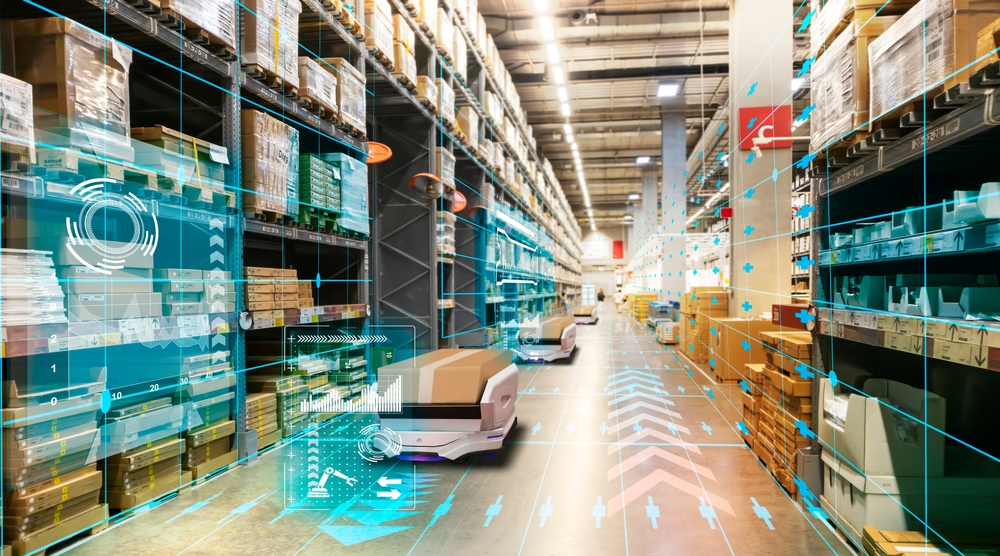A decade ago, Artificial Intelligence (AI) was largely the stuff of science fiction. Today, AI’t just real; it’s transforming the world, and the supply chain and logistics sector isn’t exempt.
The article delves deep into the pivotal role AI plays in modern supply chain management and logistics. To start, let’s examine what these terms imply.
The Intersection of AI, Supply Chain Management, and Logistics

Supply Chain Management, in its most basic form, comprises all activities connected to the sourcing, production, and delivery of goods. Logistics, on the other hand, relates to the strategies employed for the efficient transportation and delivery of these goods.
These factors are fundamental not just to businesses, but to our civilization as a whole. This is where AI comes in.
AI is designed to mimic human intelligence — to learn and predict outcomes based on a vast array of information. Given this capacity, AI’s potential in supply chain management and logistics is immense.
Present-day AI is dominated by Artificial Narrow Intelligence (ANI), which focuses on executing specific tasks. The utilization of ANI in supply chain and logistics management manifests in a variety of ways, some of which include:
-
Demand Forecasting
-
Optimization of Routing and Delivery
-
Enhancements to the Loading Process
Generative AI in Supply Chains
Generative AI refers to algorithms capable of creating new content, from blogs to computer codes. This form of AI, showcased in platforms like ChatGPT, is vital for aspects of supply chain management such as demand forecasting, automating clerical tasks, predicting operational outcomes, and considering tariffs in operational costs.
Take Echo Global Logistics, for instance. The company leverages generative AI for negotiating shipping rates, procuring transportation, and streamlining carrier management.
The Integral Role of AI in Supply Chain Management
AI is no longer futuristic conjecture; it’s an active player in supply chain management and logistics. Here are 5 key areas where AI has made significant strides:
Inventory Management
In the realm of supply chains, it’s vital to have precise knowledge of a product’s whereabouts and quantity. AI has empowered companies, from retail outlets to postal services, to monitor their inventory more accurately.
Demand Forecasting
AI’s prowess in predicting consumer behavior has found a novel application in the realm of supply chain management – demand forecasting. By accurately assessing future opportunities and threats, AI can substantially reduce inventory losses and avert stock-outs.
Transportation Optimization
To meet the demand for speedy and accurate deliveries, AI has stepped up. AI’s powerful GPS and optimization solutions rapidly and accurately calculate the most efficient routes, reinventing the transportation aspect of logistics.
Warehouse Automation

Warehouses across the globe are now turning towards AI for automating a significant fraction of their daily operations. From Amazon’s Fulfillment Centers to startups, AI is increasingly being used to systematize tasks and increase productivity, ultimately enhancing ROI.
Customer Service
AI has boosted customer service by automating responses to common queries, thus freeing up human representatives to tackle more complex customer issues.
The Pros and Cons of AI in Supply Chain Management
The incorporation of AI into supply chain management undoubtedly has its advantages:
-
Increases in Efficiency and Cost Savings
-
Enhanced Transparency and Visibility
-
Improved Customer Satisfaction
Simultaneously, AI also brings with it a set of challenges:
-
Data Privacy and Security Issues
-
Fear of Job Losses
-
High Implementation Costs
Forecasting the Impact of AI on Supply Chains
Presently, AI already contributes positively to supply chain management through improved speed, accuracy, and ROI. As the technology continues to mature, even greater benefits can be anticipated.
Gartner predicts several near-future trends, with smart robots in warehouses, AI-embedded applications in supply chain management, and increased investment in AI. As AI continues to evolve alongside smart vehicles, the prospect of autonomous long-haul vehicles, like those being developed by Uber Freight, becomes even more plausible.
AI in Supply Chain Education
The anticipated growth of AI in the coming decade makes it imperative for professionals in the field to gain AI-centered knowledge and skills. Universities like Harvard, Yale, and platforms like Coursera, already provide courses dedicated to AI. Even more specifically, Quantic’s MBA program offers a specialization in supply chain management inclusive of AI.
Adapting and learning with AI at the forefront will put professionals on the forefront of this budding field. Thus, embracing AI is no longer merely a desirable option for the supply chain sector; it’s increasingly becoming an essential one.
Conclusion
Artificial Intelligence has undoubtedly become a disruptive force that is revolutionizing the landscape of supply chain management and logistics. Its profound capacity for predictive analysis, task automation, and optimization techniques offers groundbreaking approaches to traditional practices. However, it is equally crucial to acknowledge and carefully navigate through the potential hurdles of data security, potential job displacement, and the technicalities of large-scale implementation.
Despite these challenges, the ongoing advancements and the immense potential of AI present a future ripe with opportunities. Future trends suggest an increasingly prominent role for AI in streamlining operations, enhancing efficiency, and improving customer satisfaction. As AI continues to mature, it will undeniably become an integral part of supply chain systems across the globe.
For professionals seeking to stay ahead of the curve, obtaining AI-centric knowledge and skills will be vital. As AI continues to transform supply chain management, those capable of harnessing its power will lead the way. The future of logistics and supply chains is considerably AI-driven, and the progress in AI technology heralds an exciting new era in this field.




